EXIT
Robert Durst: |
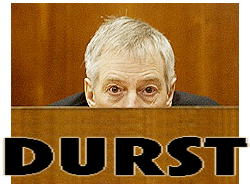
"I did not kill my
best friend.
I did dismember him."
Jan. 31, 1982 -- Kathleen Durst attends a party hosted by her friend Gilberte Najamby in Manhattan. It is the last time Najamby sees Kathleen Durst. Robert Durst claims he dropped Kathleen off to board the 9:15 p.m. train for Manhattan at the Katonah train station that night and then returned alone to their Westchester County home.
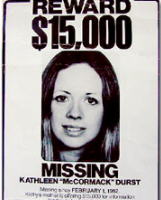
Feb. 5, 1982 -- Robert Durst reports his wife missing at the 20th Precinct
in Manhattan, five days after she went missing.
Feb. 6, 1982 -- Ellen Strauss and other friends of Kathleen Durst go to the
Dursts' weekend retreat in South Salem, N.Y., and rummage through the trash.
They find that Robert Durst has thrown out all of his wife's stuff. Strauss
gathers the items and turns them over to police investigating the disappearance.
Police question Durst in the disappearance of his wife, but no charges are
filed. His theory is that she may have been killed by - or run off with -
drug dealers.
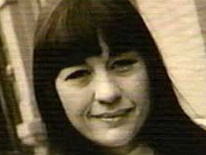
Susan Berman
Spring, 2000 - Kathleen Durst's disappearance case is reopened.
Dec 24, 2000 -- Berman is found dead in her Benedict Canyon Road House in
Los Angeles, killed by a single bullet to the back of her head. The bullet
is from a 9mm gun.
January, 2001 -- Morris Black moves into 2213 Avenue K. in Galveston, Texas
January 11, 2001 -- A rabbi marries Robert Durst and Deborah Lee Charatan,
April, 2001 -- Durst moves into 2213 Avenue K. Robert Durst timeline
Sept. 30, 2001 -- A neighbor of Durst in Galveston observes him loading bags
into a car. A 13-year-old boy spots a man's torso floating near the shoreline
of 81st Street and Channelview Drive. Police find limbs in four garbage bags
nearby. Also in the garbage bags are items that lead investigators to the
apartment house where both Durst and Morris Black live.
Police find a trail of blood that runs from Black's apartment to Durst's,
and blood is found under Durst's floor tiles. The owner of the building,
Klaus Dillman, tells police that Durst's room is leased to a woman named
Dorothy Ciner, who claims to be Durst's sister-in-law.
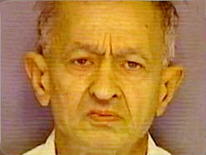
Morris Black
Oct. 5 - Officials identify the body parts as the remains of Morris Black,
a 71-year-old South Carolina native who lived at the apartment house.
Oct. 8 -- Police find a .22-caliber pistol and two ammunition clips in a
trash can behind Durst's Galveston apartment building. One ammunition clip
is full and one is one bullet shy of full. They also find a spent shell casing.
The same day, a man checks into the Holiday Inn Express on 102 Seawall Boulevard.
He gives the name Jim Turss, but the license plate number he gives is the
same as that of the vehicle Durst is driving when police arrest him the next
day.
Oct. 9 - Police arrest Robert Durst, 58, and later indict him for Black's
murder. Durst is in possession of large amounts of marijuana, a 9mm pistol,
and a butcher's saw. Also found -- a receipt from a New Orleans drycleaner.
Durst leaves jail after posting $300,000 bond.
Oct. 10 -- New Orleans landlord Michael Ogden finds a note from one of his
tenants - a mute woman - that says her plans have changed and the apartment
is no longer needed. In addition to the note, the landlord finds a wig, videotape
of a news program about Kathleen Durst's disappearance and a silver medallion
that once belonged to Durst's friend Susan Berman. The tenant also left behind
the keys to a Honda CRV. Ogden contacted police in November, when he saw
news of a fugitive who fit his tenant's description.
Oct. 16 - Durst becomes a fugitive when he fails to appear at a court hearing
in his case. A grand jury indicts him on charges of murder and jumping bail.
Oct. 17 - A man in Mobile, Ala., rents a red Chevrolet Corsica, using the
name Morris Black.
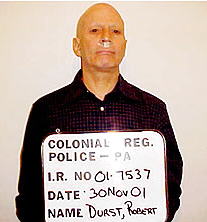
Nov. 30 - Police arrest Durst in Hanover Township, Pa., for shoplifting a
chicken salad sandwich, a newspaper and a Band-Aid from Wegmans grocery --
despite having more than $30,000 in cash. Police seize two guns, Morris Black's
South Carolina driver's license, and marijuana from the rented car.
Dec. 5 - Galveston detectives leave for Philadelphia, armed with a search
warrant for the red Chevrolet Corsica police seized from the parking lot
of the Pennsylvania grocery store where Durst was arrested.
Dec. 7 - A search of the car reveals numerous pieces of identification in
the name of Morris Black, an undisclosed amount of marijuana, two handguns
and about 80 bullets.
Jan. 25, 2002 - Durst waives his right to an extradition hearing, agreeing
to return to Galveston to face charges.
Jan. 27 - Durst arrives at the county jail.
Feb 6 -- State District Court Judge grants a motion by Durst attorney Dick
DeGuerin to exclude mention of Kathleen Durst's 1982 disappearance or Susan
Berman's 1999 murder from Durst's trial.
March 26 - Defense attorney Dick DeGuerin announces Durst intends to plead
not guilty by reason of self-defense/accident.
April 3 - Morris Black's autopsy report is released, showing Black had a
heart attack before he died but swallowed blood before his death, indicating
he had suffered a critical wound.
Aug 26, 2003 -- Jury selection
begins.
Nov. 11 - Durst found Not Guilty.
(AP) -- Durst appeared stunned when he heard
the verdict, his mouth hanging slightly open and his eyes filling with tears.
The 60-year-old millionaire hugged his attorneys, saying: "Thank you so much."
The Very Worst
of
ROBERT
DURST
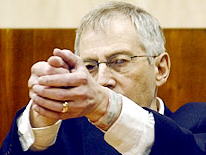
"It seemed to me the big problem was Robert Durst. I wanted to not be Robert
Durst."
"I wanted to get away from this Jeanine Pirro lady, who was making me feel
scared again."
"She was going to use a new investigation of Robert Durst to further her
career."
"I hated that wig."
"After I realized Morris Black was dead, I should have called the police."
"It was like waking up from a dream, or a nightmare, with blood everywhere.
I remember blood everywhere. I remember like I was looking down on something
and I was swimming in blood ...I don't know what is real, and I don't know
what is not real. That is what I remember."
"I was concerned that Morris was going to shoot the gun, most likely at my
face."
"Morris was shot in the face with my gun in my apartment, and I rented this
apartment dressed as a woman. I just didn't think they would believe me."

==============
Durst: "He died struggling for the gun. I did not kill him."
Prosecutor: "He was killed, was he not?"
Durst: "I like 'died' better."
==============
"Did you just say murder? Did I let you get away with that? I'm not supposed
to let you get away with that. Morris Black was not murdered."
"I cleaned it up as well as I could. I threw water everywhere with Mr. Clean.
I did not see any blood when I was finished cleaning up."
"I have not told any lies while I have been in this room."
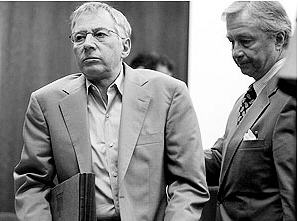
Justifiable Murder
When Dick DeGuerin isn't hugging and rejoicing with serial killers,
he teaches for the University of Texas at Austin Law School.
DeGuerin told reporters that sometimes in class he refers to an old Texas
saying about why some horse thieves get hung and some killers get off:
"No horse ever needed stealing -- but there are people who need killing."
DeGuerin and other devious defense attorneys of his ilk have repeatedly used
the tactic of officially claiming self-defense, but arguing diminished capacity
to the jury, and -- through clever questions -- slyly introducing negative
testimony about the victim.
The arguments go from a rude, David Rudolf rant, all the way to a honeyed
Harland Braun approach, but the core is always the same:
He HAD to kill, but he didn't MEAN to kill, and my client had a RIGHT to
defend himself against what he -- crazy and drunk as he was -- PERCEIVED
as a threat from a VICTIMIZER who got what was coming;
The dead victim was a piece of trash who played with fire and got burnt;
No HARM-- No FOUL;
Killing isn't the same as murder if it's JUSTIFIED.
I'm sure DeGuerin is quite happy with himself for managing to sling so much
mud at 71-year-old loner, Morris Black, that he was able to convince a jury
the cranky old man deserved to die. DeGuerin's surprise victory, however,
only reminds me of the shocking loss suffered by a young woman named Andrea
Yates.
Crafty defense lawyers, determined to win by any means necessary, create
a meaningless legal record with wild imbalances that cannot then be used
as precedent in citing genuine defenses.
They reduce the entire legal system to a popularity contest.
They do so at their own peril -- for if we start excusing away the murder
of "people who need killing" -- defense lawyers will be very high up on the
hit list.